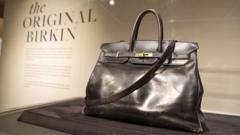Nine years after Kim Kardashian was robbed at gunpoint in her luxury Paris apartment, the elderly thieves, who initially underestimated her fame, are in court facing serious charges. The trial brings to light their blunders and the widespread implications of celebrity life on crime.**
The Jewel Heist: "Grandpa Robbers" Stand Trial for Kim Kardashian Scandal**

The Jewel Heist: "Grandpa Robbers" Stand Trial for Kim Kardashian Scandal**
A notorious group of elderly thieves dubbed the “grandpa robbers” are facing trial for their audacious heist of reality TV star Kim Kardashian's jewels in Paris, unaware of their high-profile victim's identity.**
The notorious heist that shocked the world of celebrity and crime is back in the courtroom, as the elderly gang behind the audacious robbery of Kim Kardashian stands trial almost nine years after their high-profile crime in Paris. Dubbed the “grandpa robbers” by French media, the group of thieves—including a 62-year-old, Yunice Abbas—thought they could pull off the perfect heist but were caught off guard by both their own blunders and the vast police response to the crime.
In October 2016, the group stormed Kardashian's luxury apartment dressed as police officers, armed and ready to secure what they thought would be an easy score. Over $10 million worth of jewelry was taken, including a $4 million engagement ring from rapper Kanye West. Unbeknownst to them, the reality television star would significantly influence the international narrative surrounding social media, fame, and personal safety.
As the trial unfolds in Paris, various participants of the crime are being held accountable. Among the ten defendants, five are being charged for the robbery itself while others face accessory charges. Abderrahmane Ouatiki, the night receptionist threatened during the heist, recounted the panic as the thieves bound Kardashian and fled with their stolen prize.
Despite meticulous planning, the robbers failed to consider modern law enforcement techniques, leading to their rapid identification and arrest months later. Reports suggest the gang relied on information available through Kardashian’s extensive social media presence to track her whereabouts, indicating a troubling intersection of celebrity culture and criminal enterprise.
The impact of the robbery reverberated beyond the courtroom. Kardashian publicly shared her trauma, initiating a shift in the Kardashian-Jenner family’s approach to security and social media visibility. In the wake of her ordeal, measures were established to protect family members from similar threats.
As Kim Kardashian prepares to take the stand as a witness, the trial promises to rekindle public curiosity about the complex dynamics between fame and crime, further illustrating the unpredictable world of celebrity culture. With cameras banned from the proceedings, there will be a massive media onslaught as Kardashian’s inevitable appearance ignites a frenzy.
In his memoir, Abbas expressed a desire that the trial's proceedings remain fair despite the case's high profile. Yet, observers on both sides note the stark contrast between the lives of aging thieves facing a celebrity who revolutionized social media—underscoring the chasm between the worlds of reality TV and criminal activities, and the great disconnect that allowed these old-fashioned burglars to believe they could rob a global icon without recognition.
The saga continues, showcasing how extraordinary events can unfold when old-school crime meets modern celebrity.




















